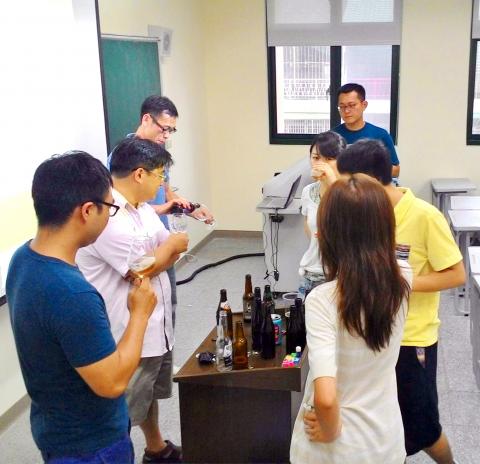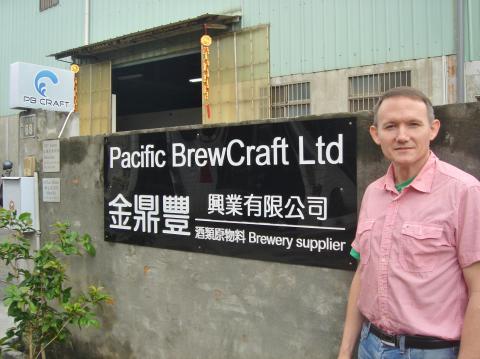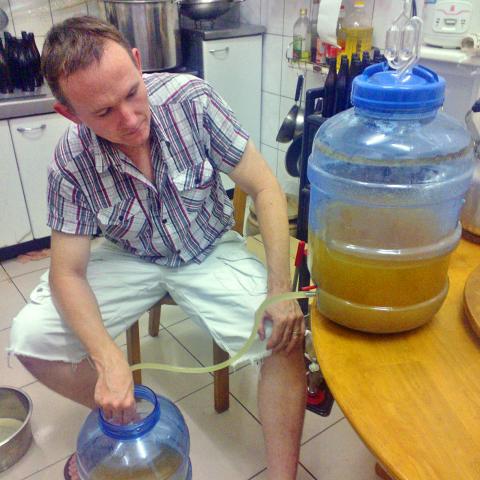Before he was a commercial brewery supplier in Taichung, Michael Forncrook worked as a software engineer in California’s Silicon Valley where he also started homebrewing as a hobby.
“Beer was my distraction from the stress of the tech world,” Forncrook tells me when I meet with him and his business partner, Jessica Huang (黃湘淇), at a cafe in Taipei.
When Forncrook and Huang, who worked in the tech industry in Hsinchu, launched Pacific Brew Craft (金鼎豐) in 2012, they were responding to a growing market. It was during this time that the Facebook group HomeBrew Maniacs (自釀啤酒狂熱份子俱樂部) was formed. A few years later, new craft breweries such as Hardcore Brewery, 23 Brewing and Taiwan Head Brewers were popping up all over the country, with many of these brewers getting their start learning how to homebrew via the Facebook group.

Photo courtesy of Pacific Brew Craft
Currently, Forncrook and Huang import wheat, barley, hops and other ingredients from Europe and the US and distribute to both homebrewers and commercial breweries (while Taiwan does grow wheat and barley, it’s not enough to sustain the industry).
In addition, they also distribute homebrewing equipment and teach homebrewing classes at two universities in Taichung, the National Taichung University of Science and Technology and Hungkuang University.
NICHE MARKET

Photo courtesy of Pacific Brew Craft
Beer production was something that the duo saw as a growing industry in both Taiwan and Asia (Pacific Brew Craft also has offices in Hong Kong and Xiamen).
Forncrook attributes this to a number of factors. Most importantly, young people in their late 20s and early 30s have more disposable income to spend on so-called “niche” markets like craft beer.
At the same time, foreign beers have been pushing their products into Asia over the last couple of years. Bars like Beer & Cheese and Chuoyinshi (啜飲室) have an extensive selection of North American craft beers on tap. Meanwhile, homebrewers from Taiwan are seeing other local brewers taking the plunge and opening breweries, thus providing more impetus for them to start their own businesses.

Photo courtesy of Pacific Brew Craft
Of course, the market is still nowhere as big as it is in the US, Europe or Japan, where there is more of an ingrained drinking culture.
But as Forncrook says, the market is currently “fashionable.”
Huang is less optimistic. She believes there is a deep-rooted reason why craft beer has yet to infiltrate the market. While younger people, especially those who have traveled overseas, are generally more open to a tipple, Huang says older generations “tend to view drinking alcohol as a bad thing.”
Huang ascribes this teetotaler culture to Buddhist influence. Europe, she says, could not be more different. Whereas beer was produced as early as the 11th century by Benedictines in Bavarian churches, Buddhism for the most part prohibits alcohol consumption.
LEGAL RESTRICTIONS
In fact, it’s not a stretch to say that craft beer is still part of a counter-culture movement. Though it’s illegal for homebrewers to sell beer without a license (as it is in other countries), there are government regulations that restrict alcohol brewing.
Put simply, it is technically illegal to pay to learn how to make alcohol — though this law is neither strictly enforced nor monitored. Contrast this with the US, where colleges not only offer homebrewing classes but also degree programs in brewing.
So far, Forncrook and Huang have not encountered any trouble with the homebrewing classes that they help run at the two Taichung universities, which are open to the public and not part of the schools’ curriculum.
They have asked the Taichung City Government to lobby the central government to change the law, stressing that the students are not producing alcohol to sell. Their efforts have been to no avail.
While the purpose of the regulation is to protect local businesses, Forncrook believes it ends up having the opposite effect.
Although it’s possible to purchase homebrewing equipment and teach yourself how to brew beer through online tutorials, due to the regulation, there aren’t many options for aspiring brewers who prefer to hone their skills in a classroom setting.
“In order to study how to become a brewer, you often have to leave Taiwan,” says Forncrook. “It’s anti-economy.
Both he and Huang hope that as the craft beer scene continues to grow, the law will eventually change to reflect this reality, though this is something that might take a little while.
“It’s not just an anti-alcohol culture, but it’s written in law, too,” Huang says.
Warning: Excessive consumption of alcohol can damage your health.
Taipei is a city that has positioned itself as being cheap and fast, but the revolution for craft drinks is taking wind and alcohol aficionados are thirsty for more. Drinking Taipei is a monthly column devoted to spotlighting chic, conceptual bars that aren’t your typical watering hole.

On April 26, The Lancet published a letter from two doctors at Taichung-based China Medical University Hospital (CMUH) warning that “Taiwan’s Health Care System is on the Brink of Collapse.” The authors said that “Years of policy inaction and mismanagement of resources have led to the National Health Insurance system operating under unsustainable conditions.” The pushback was immediate. Errors in the paper were quickly identified and publicized, to discredit the authors (the hospital apologized). CNA reported that CMUH said the letter described Taiwan in 2021 as having 62 nurses per 10,000 people, when the correct number was 78 nurses per 10,000

As we live longer, our risk of cognitive impairment is increasing. How can we delay the onset of symptoms? Do we have to give up every indulgence or can small changes make a difference? We asked neurologists for tips on how to keep our brains healthy for life. TAKE CARE OF YOUR HEALTH “All of the sensible things that apply to bodily health apply to brain health,” says Suzanne O’Sullivan, a consultant in neurology at the National Hospital for Neurology and Neurosurgery in London, and the author of The Age of Diagnosis. “When you’re 20, you can get away with absolute

May 5 to May 11 What started out as friction between Taiwanese students at Taichung First High School and a Japanese head cook escalated dramatically over the first two weeks of May 1927. It began on April 30 when the cook’s wife knew that lotus starch used in that night’s dinner had rat feces in it, but failed to inform staff until the meal was already prepared. The students believed that her silence was intentional, and filed a complaint. The school’s Japanese administrators sided with the cook’s family, dismissing the students as troublemakers and clamping down on their freedoms — with

As Donald Trump’s executive order in March led to the shuttering of Voice of America (VOA) — the global broadcaster whose roots date back to the fight against Nazi propaganda — he quickly attracted support from figures not used to aligning themselves with any US administration. Trump had ordered the US Agency for Global Media, the federal agency that funds VOA and other groups promoting independent journalism overseas, to be “eliminated to the maximum extent consistent with applicable law.” The decision suddenly halted programming in 49 languages to more than 425 million people. In Moscow, Margarita Simonyan, the hardline editor-in-chief of the